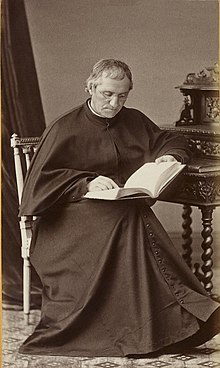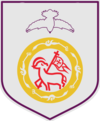| This article needs additional citations for verification. Please help improve this article by adding citations to reliable sources. Unsourced material may be challenged and removed. Find sources: "Armand David" – news · newspapers · books · scholar · JSTOR (December 2018) (Learn how and when to remove this message) |
| The Reverend Armand David CM | |
|---|---|
 | |
| Church | Catholic Church |
| Orders | |
| Ordination | 1851 |
| Personal details | |
| Born | Jean-Pierre-Armand David (1826-09-07)7 September 1826 Espelette, France |
| Died | 10 November 1900(1900-11-10) (aged 74) Paris, France |
| Denomination | Roman Catholicism |
| Occupation | Biologist |
| Other names | Père David |
| Known for | Documenting species of Chinese flora and fauna exotic to Europe |
| Scientific career | |
| Fields | Botany, zoology |
| Author abbrev. (botany) | David |
| Author abbrev. (zoology) | David |
Armand David, CM (7 September 1826, Espelette – 10 November 1900, Paris) was a Lazarist missionary Catholic priest as well as a zoologist and a botanist from the French Basque Country.
Several species, such as Père David's deer, are named after him — Père David being French for Father David.
Biography

Born in Espelette near Bayonne, in the north of Basque Country, in Pyrénées-Atlantiques département of France, he entered the Congregation of the Mission in 1848, having already displayed great fondness for the natural sciences. Ordained in 1851, he was in 1862 sent to Peking, where he began a collection of material for a museum of natural history, mainly zoological, but in which botany, geology, and palaeontology were also well represented.
At the request of the French government, important specimens from his collection were sent to Paris and aroused the greatest interest. The Jardin des Plantes commissioned him to undertake scientific journeys through China to make further collections. He succeeded in obtaining many specimens of hitherto unknown animals and plants, and the value of his comprehensive collections for the advance of systematic zoology and especially for the advancement of animal geography received universal recognition from the scientific community at Paris in April, 1888. He had found in China all together 200 species of wild animals, of which 63 were hitherto unknown to zoologists, and 807 species of birds, 65 of which had not been described before. He made a large collection of reptiles, amphibians, and fishes and handed it over to specialists for further study. Also, a large number of moths and insects, many of them hitherto unknown, were brought to the museum of the Jardin des Plantes. What Father David's scientific journeys meant for botany may be inferred from the fact that among the rhododendrons which he collected no less than fifty-two new species were found and among the primulae about forty, while the Western Mountains of China furnished an even greater number of hitherto unknown species of gentian.
The most notable of the animals 'found' by David, which were hitherto unknown to Europeans, were the giant panda in Baoxing County and Père David's deer. The latter had disappeared with the exception of a few preserved in the gardens of the emperor of China, but David succeeded in securing a specimen and sent it to Europe. David also sent back the first emerald ash borer specimen. In the midst of his work as a naturalist Father David did not neglect his missionary labours, and was noted for his careful devotion to his religious duties and for his obedience to every detail of his order's rules.
The standard author abbreviation David is used to indicate this person as the author when citing a botanical name.Eponymy
The plants Buddleja davidii and Ulmus davidiana, the David Elm, were named for him, and also Lilium davidii. The fish Sarcocheilichthys davidi was named in his honor by Henri Émile Sauvage in 1878, because Père David collected the type specimen. Père David's deer (Elaphurus davidianus) was likewise named after him by Alphonse Milne-Edwards.
Père David's Rat Snake (Elaphe davidi) was named in his honor by Henri Émile Sauvage in 1884.
See also
- Catholic Church in Sichuan
- Catholic Church in China
- Jesuit China missions
- List of Roman Catholic scientist-clerics
Catholic missionaries in China
- Michel Benoist
- Giuseppe Castiglione
- Armand David
- Matteo Ricci
- Johann Adam Schall von Bell
- Ferdinand Verbiest
- St. Francis Xavier
Eponymous taxa
- Père David's tit
- Père David's deer
- Davidia involucrata
- Père David's snowfinch
- Père David's mole
- Père David's owl
- Père David's vole
- Père David's rock squirrel
- Père David's laughingthrush
- Andrias davidianus
- Clematis armandii
- Buddleia davidii
- Viburnum davidii
- Acer davidii
References
- ^ "Armand David (1826-1900)". data.bnf.fr (in French). Paris: Bibliothèque nationale de France. 5 October 2018. Archived from the original on 14 December 2018. Retrieved 14 December 2018.
- Herbermann, Charles, ed. (1913). "Armand David" . Catholic Encyclopedia. New York: Robert Appleton Company.
- Miller, Matthew. "Battle of the Ash Borer: Decades after Beetles Arrived in Michigan, Researchers Looking to Slow Devastation". Lansing State Journal. Archived from the original on 1 August 2014. Retrieved 20 August 2014.
- International Plant Names Index. David.
- Dark, Ben (4 April 2022). "Urban Perennial". The Big Issue. p. 39.
- Christopher Scharpf & Kenneth J. Lazara (22 September 2018). "Order CYPRINIFORMES: Families ACHEILOGNATHIDAE, GOBIONIDAE and TANICHTHYIDAE". The ETYFish Project Fish Name Etymology Database. Christopher Scharpf and Kenneth J. Lazara. Archived from the original on 29 September 2019. Retrieved 3 March 2021.
- Beolens, Bo; Watkins, Michael; Grayson, Michael (2011). The Eponym Dictionary of Reptiles. Baltimore: Johns Hopkins University Press. xiii + 296 pp. ISBN 978-1-4214-0135-5. ("Père David", p. 203).
 This article incorporates text from a publication now in the public domain: Walsh, James J. (1913). "Armand David". In Herbermann, Charles (ed.). Catholic Encyclopedia. New York: Robert Appleton Company.
This article incorporates text from a publication now in the public domain: Walsh, James J. (1913). "Armand David". In Herbermann, Charles (ed.). Catholic Encyclopedia. New York: Robert Appleton Company.
External links
- Père Jean Pierre Armand David CM, a biography by Bernard Scott
- 19th-century French botanists
- Botanists active in China
- 19th-century French zoologists
- 1826 births
- 1900 deaths
- Roman Catholic missionaries in Sichuan
- Roman Catholic missionaries in China
- Catholic clergy scientists
- French-Basque people
- French explorers
- Vincentians
- Zoological collectors
- French expatriates in China
- People from Labourd
- 19th-century French Roman Catholic priests
- Missionary botanists
